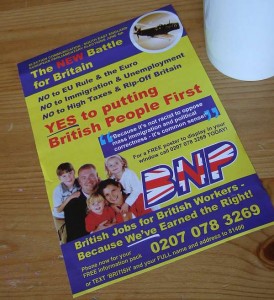 When people get anxious about their future, it drives support for right wing authoritarianism. So it’s hardly surprising that the economic meltdown has been a boon for the various neo-fascist parties around Europe, especially in the UK.
When people get anxious about their future, it drives support for right wing authoritarianism. So it’s hardly surprising that the economic meltdown has been a boon for the various neo-fascist parties around Europe, especially in the UK.
Still, it was a bit of a shock to come home the other day to find that someone had stuffed a leaflet for the British National Party, the largest English fascist party, through my door. It seems they’ve arrived in some small way even in my fairly untroubled corner of England!
The leaflet itself was pretty much what you’d expect. An obsession with warfare (it even includes a list of battles dating back to Trafalgar!) coupled with stoking up in-group loyalty and out-group fears.
It got me thinking, though, about why people turn to these kinds of parties when they feel anxious.
One of the leading researchers in this field is John Jost, at New York University. Back in 2003, he analysed all the published studies to show that fear of uncertainty and feelings of being threatened are higher in conservatives and extremists. But what he couldn’t tell from the data was whether these factors lead to right wing extremism in particular, or just extremism in general.
He did a follow-up study, giving a battery of questionnaires to undergrads, to try to settle this. Using a statistical analysis of how their responses clustered, he found that fear of uncertainty and threat in fact were associated to conservatism, and only via that to extremism. In other words, both factors contribute to right wing extremism, but don’t explain left wing extremism.
What’s more, he also went on to show that fear of uncertainty seemed to cause resistance to change, whereas fear of threats lead to an opposition to equality. These two factors mediated the effects of the two fears on political views.
So this triggers another question – one that’s unanswered as far as I know. Does this help to explain the association between religion and right-wing authoritarianism? There are at least two possible explanations for why these two sets of ideologies often go together.
One is that religion might represent tradition and ethnic identity. If so, then the association is purely circumstantial. If a society were historically atheist, then that would be held up instead as the rallying cry (think of a historically communist state facing some kind of threat).
The other is that fear – of uncertainty and threats – generates both conservative views and also increases religiosity. As far as I know, there’s been surprisingly little research into this possibility. It is know that ‘existential anxiety’ (the fear of death) can increase religiosity. But there’s no study I know of that looks into whether more generalised fear and uncertainty make people more religious – even though it’s widely supposed to be the case.
_______________________________________________________________________________________
![]() Jost, J., Napier, J., Thorisdottir, H., Gosling, S., Palfai, T., & Ostafin, B. (2007). Are Needs to Manage Uncertainty and Threat Associated With Political Conservatism or Ideological Extremity? Personality and Social Psychology Bulletin, 33 (7), 989-1007 DOI: 10.1177/0146167207301028
Jost, J., Napier, J., Thorisdottir, H., Gosling, S., Palfai, T., & Ostafin, B. (2007). Are Needs to Manage Uncertainty and Threat Associated With Political Conservatism or Ideological Extremity? Personality and Social Psychology Bulletin, 33 (7), 989-1007 DOI: 10.1177/0146167207301028
 This work by Tom Rees is licensed under a Creative Commons Attribution-Share Alike 2.0 UK: England & Wales License.
This work by Tom Rees is licensed under a Creative Commons Attribution-Share Alike 2.0 UK: England & Wales License.














